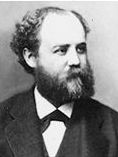WE possess in some of the minerals, medicines of inestimable value in the treatment of organic lesions. Thus, for instance, fatty degeneration, cirrhosis, albuminuria and paralysis have been cured by Aurum, Argentum, Manganum, Cuprum and Plumbum, and coeteris paribus, will be benefited by one or other of these same metals.
The minerals may also be advantageously employed as nutritive remedies. I know that I am treading upon debatable ground in advocating the use of the term nutritive. Still, I claim that there are some medicines which when employed according to the Law of Similars, favor bodily growth and repair more than other drugs do. And it is with this fact in mind that I prefer regarding certain substances as nutritive remedies; CalcareaPhos, for example, symptoms indicating it favors the deposit of lime at points of union of fractured bones.
So, in reference to the metals under consideration, Dr. Burnett, an excellent Homoeopathist, has found that Gold will hasten the mainly growth of the puny boy; Grauvogl has proved that Platina will aid in the resuscitation of the child whose health has been broken by pre-public masturbation. And, similarly we know that Lead is needed often in Paralysis with Atrophy, Argentum Nitricum in illnourished nerves, Copper when mental and bodily overexertion have impaired the strength and led to emaciation; and finally, I think that Manganese may, under certain circumstances, be regarded as a nutritive remedy for women.
A few months ago, Dr. Ringer published his experiments with the Permanganate of Potash, claiming that it was the Manganese in the compound that effected almost invariably a restoration of suppressed menses.
If, now, we turn to provings of Manganese as collated in Allen’s Encyclopaedia, we find such symptoms as these; pressure in the female genitals (Hahnemann); gripping, pinching above the pubes, eructations, weakness of the feet -all characteristic symptoms followed by heaviness in the head, and a menstrual flow that is thick and black (Nenning).
These effects show plainly that, if given in large and crude dose employed by Dr. Ringer, Manganese can assuredly force the menses. To us, however, this fact is invaluable, not because it teaches us a rough and unnatural means of establishing a tardy or in-operative function, but because it becomes a symptom worthy of consideration in the application of the only law of cure to one of the ailments of women.
Last of all I had occasion to treat a young lady who, ever since puberty, a period of eleven years, had suffered from scanty and delayed menses,. Pulsatilla, Caulophyllum, etc., failed. Finally, taking a new “totality of symptoms”, I found in addition to the menstrual tardiness, general emaciation, weak pulse, pale sunken face, and great weakness of the back and limbs after the least exertion. These symptoms are all
to be found in the provings of Manganese, and remembering, too, the symptoms of Nenning and the experiments of Ringer, calling to mind, also, the fact that workers in Manganese emaciate and develop symptoms of nervous weakness even to Paralysis, I saw in this drug a similimum for my patient. To make my choice even more certain, and to test the power of the drug to cure amenorrhoea with ineffectual urging pains, I enquired particularly concerning the symptoms incident to the menstrual epochs. The replay was that there was always at these times much pressure and pain, but the system seemed to weak to secure the establishment of the flow. Manganum Acet. 3 was give twice daily for two weeks before each menstrual period.
The effect was all that could be desired. For the first time in her life the menses came in proper time, and, what was more pleasing to the patient, with but little inconvenience. The lady has slowly but steadily improved in strength, and now menstruates quite naturally.
Lest I be misunderstood in my support of the term nutritive, I wish, even at the risk of repetition, to say that I men simply the expression of the fact that drugs which can cause lesions characterized by mal-nutrition are often, of necessity, Homoeopathically adapted to the restoration to a normal state of bodily nourishment. Such medicines will act more profoundly and more lastingly than drugs which bear only a superficial resemblance to the disease to be treated. But in all cases, the selection of the remedy must be made by the rules of the Organon, by the similarity of the symptoms. There is no the known way of finding a curative drug. And there is no law of cure not rule or method as some teach-known to the scientific world but the Law of Similars.

